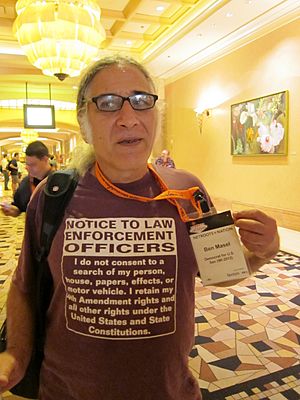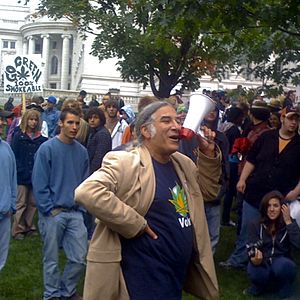Ben Masel facts for kids
Quick facts for kids
Ben Masel
|
|
|---|---|

Ben Masel at the Wisconsin Capitol in 2010
|
|
| Born |
Bennett A. Masel
October 17, 1954 |
| Died | April 30, 2011 (aged 56) |
| Occupation | Publisher First Amendment plaintiff |
| Years active |
|
| Known for |
|
| Children | Semilla Anderson |
Bennett A. “Ben” Masel (born October 17, 1954 – died April 30, 2011) was an American writer and publisher. He was also a strong supporter of free speech and often ran for public office. Ben Masel was a very good chess player.
Masel was known for his unique way of protesting, often using "Yippie" style shows. He was active in the anti-war movement and supported workers' rights. He was born in the Bronx, New York, and grew up in New Jersey. In 1971, he moved to Madison, where he became a well-known person in Wisconsin politics for 40 years. He passed away from cancer in 2011.
Contents
Ben Masel's Life and Activism
Early Life and Protests
Ben Masel was born in New York in 1954. When he was a teenager, he joined the Youth International Party, also known as the Yippies. This group used humor and protests to share their ideas. Ben was so active that he became the youngest person on a special list called "Nixon's Enemies List." This list included people the government saw as political opponents.
In 1968, Masel was arrested during Yippie protests at the Democratic National Convention in Chicago. This event started his long career of fighting for First Amendment rights, which protect freedoms like speech and protest.
In 1971, Masel moved to Madison, Wisconsin. He briefly studied at the University of Wisconsin. However, he was asked to leave because he was involved in student protests.
Masel was a Yippie protester who used "street theatre" to speak out against the Vietnam War and for personal freedom. In 1976, he gained national attention for speaking loudly against Alabama Governor George Wallace. Wallace was known for supporting segregation, which means keeping people of different races separate. Masel did this while in a wheelchair. Throughout his life, Ben Masel was arrested 137 times for his protest activities.
Writing and Publishing Work
Ben Masel worked as a reporter for The Yipster Times. This was a newspaper published by the Youth International Party (Yippies).
In 1985, Masel helped write a book called Blacklisted News: Secret Histories from Chicago, ’68 to 1984. This book told the story of the Youth International Party.
From 1987 to 1993, Masel published his own underground newspaper called Zenger.
Even until he passed away, Masel used online blogs and petitions on sites like Myspace and Facebook. He used these to share his political ideas and gather support.
Running for Public Office
In 1990, Masel ran for Wisconsin Governor. He ran against Tommy Thompson in the Republican primary election.
In 1992, Masel tried to become the sheriff of Dane County, Wisconsin. His campaign poster showed him with the slogan: "Nothing to Hide, Masel for Sheriff." He received over 7,000 votes. In 1994, he was officially on the ballot as the Democratic candidate for sheriff and got more than 39,000 votes.
In 2006, Masel challenged US Senator Herb Kohl in the Democratic primary. He received over 50,000 votes, which was about 15 percent of all votes.
When he was diagnosed with cancer in 2011, Masel was once again trying to get the Wisconsin Democratic Party's support to run for US senator.
Fighting for Civil Rights
Ben Masel was known as a professional protester. In 2000, he received $95,000 in a legal settlement from Sauk County, Wisconsin. This happened after police arrested him and others at a festival. They were told to leave a private field, but Masel refused.
On June 29, 2006, Masel was gathering signatures for his election campaign, which was allowed by law. Two police officers from the University of Wisconsin–Madison confronted him. They threw him to the ground, held him down, and used pepper spray on his face. Masel filed a lawsuit against the officers. The case went to trial in 2009, but the jury could not agree. Before a second trial in 2010, the case was settled out of court. Masel agreed to accept $7,500 from the state of Wisconsin to end the appeal.
Amy Gros-Louis, a longtime friend of Masel, told a reporter that "Ben knew the laws better than the police did." Masel always fought against rules that limited freedom of speech and the right to gather peacefully. If police tried to stop him, he would often sue them. According to Jeff Scott Olson, Masel's lawyer, Masel usually won these cases.
Ben Masel's Legacy
The 420 Chess Club held an online competition in his honor. It was called The Ben Masel Memorial 420 Chess Tournament. It took place from May 2011 to February 2012.
On May 17, 2011, the City of Madison Common Council officially declared April 20 to be Ben Masel Day.
In August 2011, Masel was named High Times’ Freedom Fighter of the Month.
Illness and Passing
In January 2011, Ben Masel was diagnosed with lung cancer. He received radiation treatments and was given medicine to help him breathe. However, he became too weak for chemotherapy. Despite his illness, Masel remained positive and continued to protest. He even went against his doctor's advice to join a month-long protest for labor rights at the Wisconsin State Capitol in April. Masel did not have health insurance. He passed away in a hospice, surrounded by his friends and family, on April 30, 2011. He is survived by his daughter, Semilla Anderson, and his granddaughter, Anandi.
 | Georgia Louise Harris Brown |
 | Julian Abele |
 | Norma Merrick Sklarek |
 | William Sidney Pittman |


